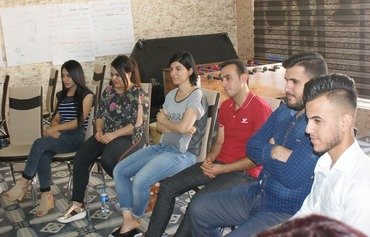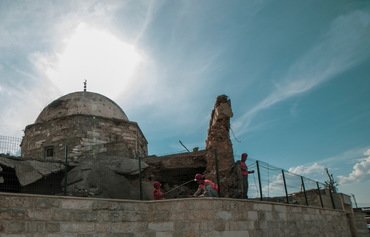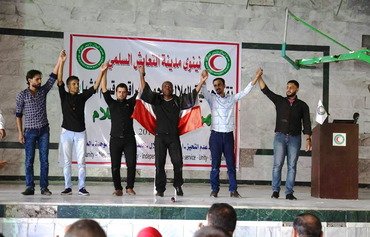Two years after the "Islamic State of Iraq and Syria" (ISIS) was ousted from Mosul, the city is still struggling to redress the lingering social impact of its rule.
While it was in control of the Ninawa province city, the extremist group drove out, tortured or sold into slavery many members of the various religious and ethnic communities who had previously lived there harmoniously.
Governmental and civil society initiatives have since sought to restore the good relations that had existed between the city's various groups, with young people serving as the most active social force in repairing the damage to society.
On July 11th, the Friends of Youth Forum, a non-governmental organisation run by Mosul youth, held a festival to promote social unity, with the support of the US Agency for International Development (USAID).
![The 'We are all Mosulis' festival, held July 11th, sought to remind participants of the city's tolerant past. [Photo courtesy of the Friends of Youth Forum]](/cnmi_di/images/2019/08/02/19247-Mosul-peaceful-coexistence-600_384.jpg)
The 'We are all Mosulis' festival, held July 11th, sought to remind participants of the city's tolerant past. [Photo courtesy of the Friends of Youth Forum]
Festival organisers said they sought to highlight the city’s history, which is rich with diversity, with the goal of overcoming ethnic and religious differences.
"We are all Mosulis" featured theatrical, musical and folkloric performances.
Among the highlights were dabke dance performances by youth wearing traditional Arab, Kurdish, Yazidi, Turkman and Christian clothes, singing in the various languages that can be heard on Mosul's streets.
"Holding such festivals reflects the close relationships that exist among young people of all religious and ethnic backgrounds," Friends of Youth Forum member Adel Mikha told Diyaruna.
"We affirm here that despite all the difficult circumstances Mosulis experienced in the recent past, they are determined to maintain social co-existence and preserve the province’s social mosaic," he added.
Long history of co-existence
Mosul has a long history of social co-existence.
Before the advent of Islam, Mosul embraced the followers of faiths such as Christianity, Judaism and Zoroastrianism, University of Mosul professor of Islamic archaeology Ahmed Kassem told Diyaruna.
Islam then became the dominant religion, he said, but its followers allowed members of other faiths the freedom to practice their rituals.
"Islam is not a religion of coercion," he said, "but rather of tolerance and love", as evidenced by the continued existence of many ancient churches in the city of Mosul, including Mar Shaya in the Qlaayat area which dates back to 570 AD.
Another example of the city's tolerance is its reception of the Armenians, whom it welcomed in when they were displaced after World War I, he said.
The people of Mosul provided them with help and support, and allowed them to practice their faith and build their own churches, including the city's Armenian Church, he said, noting that some later chose to convert to Islam.
Contributing to social peace
"Co-existence among the various components of Mosul society is a necessity, not an option," Ninawa provincial council member Ghazwan al-Daoudi told Diyaruna.
This needs to happen for the advancement of the province, he said.
ISIS tried to erase Mosul’s image as a city where peaceful co-existence is the norm, he added, and worked hard to create a rift between the various religious and ethnic groups who have made their home there.
The extremist group has not succeeded in creating lasting divisions, he stressed, calling for the active promotion of a culture of tolerance and co-existence.
To this end, he added, city residents must support all activities and events put on by civil society organisations that contribute to the city's reunification.

![Folkloric performances were part of the 'We are all Mosulis' celebration, held in the Ninawa province city on July 11th. [Photo courtesy of the Friends of Youth Forum]](/cnmi_di/images/2019/08/02/19246-Mosul-cultural-festival-600_384.jpg)






